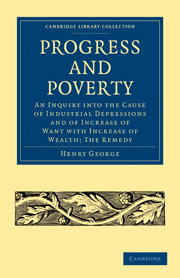 Progress and Poverty
Progress and Poverty Book contents
- Frontmatter
- PREFACE TO FOURTH EDITION
- Contents
- INTRODUCTORY
- BOOK I WAGES AND CAPITAL
- BOOK II POPULATION AND SUBSISTENCE
- BOOK III THE LAWS OF DISTRIBUTION
- BOOK IV EFFECT OF MATERIAL PROGRESS UPON THE DISTRIBUTION OF WEALTH
- BOOK V THE PROBLEM SOLVED
- BOOK VI THE REMEDY
- BOOK VII JUSTICE OF THE REMEDY
- BOOK VIII APPLICATION OF THE REMEDY
- BOOK IX EFFECTS OF THE REMEDY
- Chapter I Of the effect upon the production of wealth
- Chapter II Of the effect upon distribution and thence upon production
- Chapter III Of the effect upon individuals and classes
- Chapter IV Of the changes that would be wrought in social organization and social life
- BOOK X THE LAW OF HUMAN PROGRESS
- CONCLUSION
- INDEX
Chapter I - Of the effect upon the production of wealth
Published online by Cambridge University Press: 07 September 2011
- Frontmatter
- PREFACE TO FOURTH EDITION
- Contents
- INTRODUCTORY
- BOOK I WAGES AND CAPITAL
- BOOK II POPULATION AND SUBSISTENCE
- BOOK III THE LAWS OF DISTRIBUTION
- BOOK IV EFFECT OF MATERIAL PROGRESS UPON THE DISTRIBUTION OF WEALTH
- BOOK V THE PROBLEM SOLVED
- BOOK VI THE REMEDY
- BOOK VII JUSTICE OF THE REMEDY
- BOOK VIII APPLICATION OF THE REMEDY
- BOOK IX EFFECTS OF THE REMEDY
- Chapter I Of the effect upon the production of wealth
- Chapter II Of the effect upon distribution and thence upon production
- Chapter III Of the effect upon individuals and classes
- Chapter IV Of the changes that would be wrought in social organization and social life
- BOOK X THE LAW OF HUMAN PROGRESS
- CONCLUSION
- INDEX
Summary
The elder Mirabeau, we are told, ranked the proposition of Quesnay, to substitute one single tax on rent (the impost unique) for all other taxes, as a discovery equal in utility to the invention of writing or the substitution of the use of money for barter.
To whoever will think over the matter, this saying will appear an evidence of penetration rather than of extravagance. The advantages which would be gained by substituting for the numerous taxes by which the public revenues are now raised, a single tax levied upon the value of land, will appear more and more important the more they are considered. This is the secret which would transform the little village into the great city. With all the burdens removed which now oppress industry and hamper exchange, the production of wealth would go on with a rapidity now undreamed of. This, in its turn, would lead to an increase in the value of land—a new surplus which society might take for general purposes. And released from the difficulties which attend the collection of revenue in a way that begets corruption and renders legislation the tool of special interests, society could assume functions which the increasing complexity of life makes it desirable to assume, but which the prospect of political demoralization under the present system now leads thoughtful men to shrink from.
- Type
- Chapter
- Information
- Progress and PovertyAn Inquiry into the Cause of Industrial Depressions and of Increase of Want with Increase of Wealth; The Remedy, pp. 389 - 394Publisher: Cambridge University PressPrint publication year: 2009First published in: 1881


